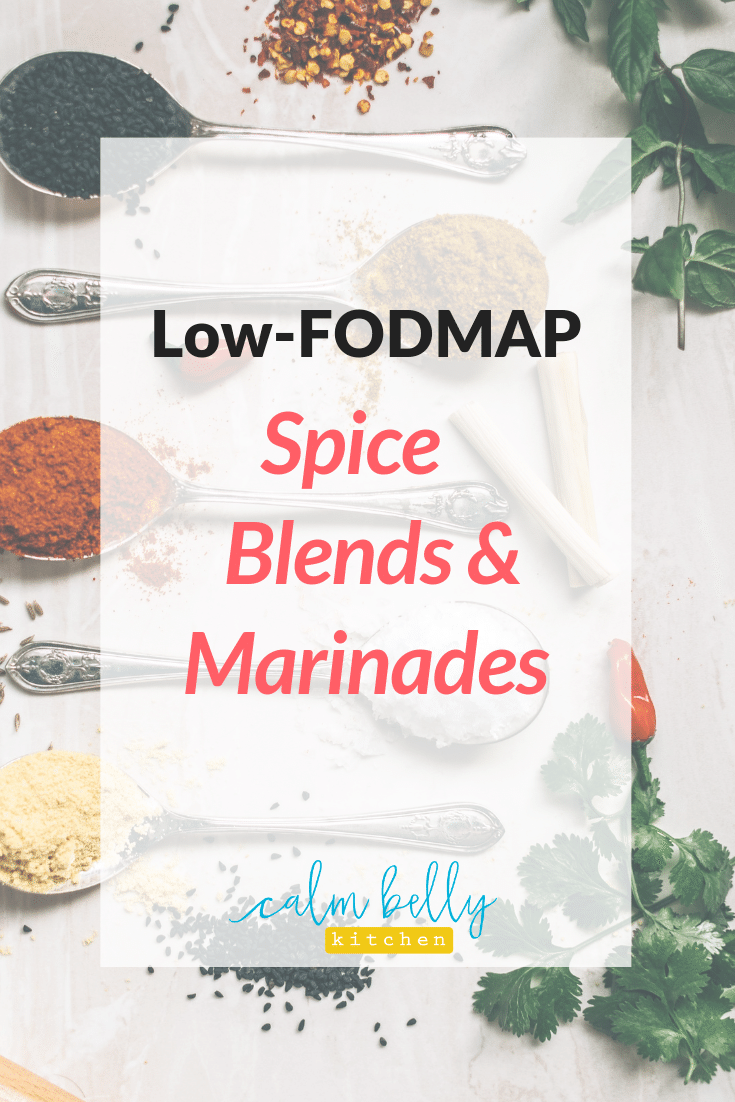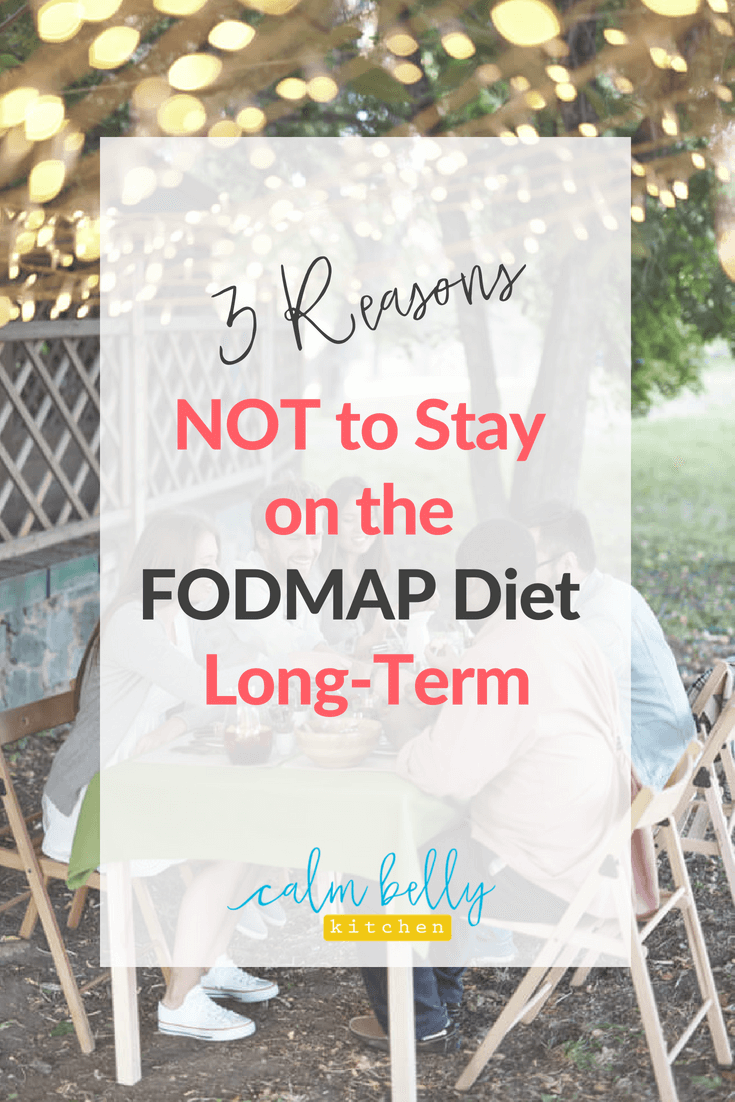Exercise can improve IBS symptoms, but what exactly should YOU do to reap the benefits? What are the best exercises for bloating, for IBS-D, for IBS-C? Should you workout during a flare up? Click through to learn all this and more.
Guide to SIBO: Symptoms, Causes, and Natural Treatment Options
Foods That Cause Constipation (and how the FODMAP Diet can help!)
Save it on Pinterest!
Dealing with occasional constipation is very low on the list of fun and enjoyable things. Dealing with chronic constipation (infrequent bowel movements over an extended period of time) is even more aggravating.
The abdominal pain, the discomfort, the cramping, pinching, and feeling of being unable to let it all go… it’s pretty awful, and it impacts your daily life in countless ways.
If you’ve been struggling with chronic constipation, and nothing you’ve tried so far has helped, you might have IBS-C. And if that’s what’s going on, there’s good news: The FODMAP diet can help you with this stubborn symptom.
Unlike the occasional bout of constipation, IBS-C is caused by specific types of carbohydrates called FODMAPs. FODMAPs are found in a wide array of foods.
While these foods are perfectly healthy for most people, they can trigger symptoms if you have IBS. (And if you aren’t sure whether your constipation is caused by IBS or not, keep reading.)
Foods That Cause Constipation
For people with IBS-C, constipation is caused by the fermentation of high-FODMAP foods as they sit in the large intestine. These foods can’t be digested properly by people with IBS, and the byproduct of that fermentation is gas, among other things. This, in turn, causes the bloating, pain, and digestive slow-down. No fun.
Here are some of the most common constipation-causing high-FODMAP foods:
Apples
Pears
Peaches
Cherries
Blackberries
Watermelon
Plums
Dried fruit
Asparagus
Cauliflower
Peas
Onions
Garlic
Milk, yogurt & ice cream
Wheat bread and pasta
Rye bread
Beans
Cashews & pistachios
Coconut flour
For a free cheat sheet listing high-FODMAP foods, click here.
Some people with IBS are prone to constipation, while others are prone to diarrhea, in what’s called IBS-D. And some folks with IBS experience both constipation and diarrhea, at different times. It’s not entirely sure why this happens. Research is still being done!
FODMAPs are the major constipation culprit if you have IBS, but other foods can also play a role if eaten in large quantities or very frequently.
Other constipation-causing foods:
High Fat Meals - If you’ve spent a weekend eating fried food or lots of desserts and chocolate, you might end up constipated since fatty meals are slower to digest.
Red Meat - It can be higher in fat than other proteins, but its high iron content can stop you up as well. But don’t give red meat completely--just reduce the frequency so you can still get the health benefits.
Starchy, Low-Fiber Foods - Unripe bananas, white bread, and white rice can move through the digestive tract slowly. Opt for whole wheat bread and brown rice instead.
Alcohol - It irritates the stomach and dehydrates you, leading to slow-moving bowels. Drink in moderation and get plenty of fluids.
Natural Ways to Relieve Constipation
Constipation is a stubborn condition so often multiple strategies are needed. So, where do you start?
More Fiber? Yes, But...
A commonly-held belief with constipation is that it’s caused by a lack of fiber. Because of this, people often assume they need to add fiber to their diet, in the form of things like whole wheat breads and pastas, beans, fibrous veggies, and so forth.
But with constipation caused by IBS-C, this actually ends up loading the system with more high-FODMAP foods, causing even more problems. Tried adding more fiber to your diet, and it hasn’t helped? You might be dealing with IBS. Increasing your FODMAP intake is going to increase the problems.
Soluble vs. Insoluble Fiber
Even on a low-FODMAP diet plan, getting enough fiber is important, but you have to do it safely, in line with your plan. Foods like potatoes, brown rice, quinoa, nuts, chia seeds, spinach, other greens, carrots, strawberries can be great sources of safe fiber. You can aim for 20–25 grams per day, and adjust based on how you feel.
You can also take a fiber supplement, but if you have IBS, it’s important to only add the right kind of fiber to your diet.
Soluble fiber attracts water, which helps with the formation of normal stools--not too loose or too hard. Insoluble fiber, on the other hand, keeps things moving through your digestive tract.
Both soluble and insoluble fiber are good to add for IBS-C. For IBS-D, you should avoid the insoluble type.
Soluble fiber is great because it’s gentle and works for both IBS-C and IBS-D, regulating the bowels regardless of what extreme you’re dealing with.
One brand of soluble fiber I like and recommend is Heather’s Tummy Fiber. It’s been made specifically for IBS sufferers, and many of my clients love it. If you don’t have IBS, other fiber supplements made for constipation are a good option, too.
Of course, there are often other reasons why people experience occasional or chronic constipation. Those can be things like food allergies and intolerances, side effects of medication, unbalanced diet, other dietary or GI conditions, surgeries, or even hydration.
With any kind of constipation, it can be challenging to treat, and often done by trial and error. But if you have IBS, or suspect that it’s the source of your symptoms, then the FODMAP diet should be your first stop, because of how effective it can be at identifying those specific trigger foods.
The FODMAP Diet for Constipation
People hear the word ‘diet’ and think, ‘I’m going to be stuck eating three boring foods for the rest of my life! Maybe the symptoms are worth it, to keep enjoying the foods I love.’ I’m here to tell you that this isn’t the case!
The FODMAP diet is an action plan to help you identify which specific trigger foods are worsening your symptoms, so you can avoid them. It’s a three-step plan that begins with a short period of eating a very low-FODMAP diet, for only four to six weeks.
If removing FODMAPS helps you feel better, then you know you are on the right track.
Next, foods are slowly reintroduced, and your symptoms are monitored. As soon as a culprit is identified, you know what it is that’s messing you up! After reintroduction and analysis, you can go on with eating a wide array of healthy foods in sensible portions, and avoiding the foods that cause you discomfort.
I have a ton more information about getting started on the FODMAP diet! You can check it out here.
What about some other, at-home things you can do?
Essential Oils for Constipation
The use of essential oils can work wonders for constipation. Ginger, Peppermint, Fennel, Lavender, and Chamomile are some of the top choices.
You can add them to a diffuser throughout the day, add them to a nice warm bath, or gently massage your stomach with them, after they’ve been diluted in a safe carrier oil. (Never apply essential oils directly to your skin!)
Osmotic Laxatives
Osmotic laxatives such as MiraLAX are a great choice for constipation because they don’t cause harsh side effects like traditional laxatives do.
They work by drawing water into the colon and softening the hard stool there, making it much easier to pass. They can be a good choice for constipation, even as a result of IBS-C, but should also be paired with dietary changes overall, to prevent the stools from getting too hard.
Another option is Magnesium, which also draws water into the colon and intestines to soften the stools. Like MiraLAX, this softening allows the muscles of the digestive system to flex and move more naturally, passing the softened stool without pain or constriction.
Magnesium can be added to your diet by increasing your intake of magnesium-rich foods, such as spinach, peanuts, oatmeal, potatoes, rice, and salmon. Or, you can take a Magnesium supplement; I prefer Magnesium Citrate, because of your body’s ability to absorb it easily, but other forms can work too.
The Recommended Daily Allowance of magnesium—including food intake—is 420 mg for men and 320 mg for women.
Osmotic laxatives (or any laxative) should be reserved for occasional use, rather than an everyday go-to. Use them when symptoms are particularly bad, or you aren’t able to stick to your normal diet (think travel, illness, or times of high stress).
Conclusion
Constipation is frustrating, but you can make a difference with your symptoms through a few simple changes. Avoiding foods that cause constipation in the first place is key. The next step is trying additional remedies until you find the right mix that works for YOUR body.
If you aren’t sure whether your chronic constipation is caused by IBS or something else, a gastroenterologist should be your first stop to uncover the source of your symptoms.
If you want to know more, or if your head is spinning from a recent IBS diagnosis, then check out our ebooks. You’ll learn how to get started with the FODMAP Diet as quickly (and painlessly!) as possible.
This post contains affiliate links.
The Best IBS Diet: What to Eat to Calm Your Belly
IBS Symptoms in Females and What To Do About It
IBS Symptoms in Females and What To Do About It
Save it on Pinterest!
It can come on so suddenly, completely without warning.
You start the day feeling fine and then – BAM! Suddenly you’re experiencing serious abdominal pains and cramping, bloating, diarrhea, or constipation (sometimes both!).
Was it something I ate? you might wonder as you rush to the restroom.
The truth is, just about anything can cause these kinds of digestive upsets, but they’re also common symptoms of IBS. If you’re experiencing them regularly, you could be one of the 10–15 percent of the adult population in the U.S. that suffers from Irritable Bowel Syndrome. In fact, IBS is one of the most common conditions diagnosed by gastroenterologists and primary care physicians, according to the American College of Gastroenterology.
But how can you tell if your upset stomach is really something more serious?
Common IBS Symptoms in Females
Interestingly, IBS is diagnosed more often in women than men in the US — at almost twice the rate.
Doctors aren’t exactly sure why, but some research suggests a connection between the hormones estrogen and progesterone and IBS symptoms in females. In fact, some women report increased IBS symptoms like back pain during their menstrual cycles.
In general, IBS involves abdominal pain and changes in stools. Although anyone can experience pain or bloating from gas after a particular meal, and our stools are constantly changing based on what we eat, IBS symptoms tend to be persistent and frequent.
Overall, Irritable Bowel Syndrome symptoms can include:
Abdominal pain
Cramping
Bloating
Excessive gas
Diarrhea
Constipation
Indigestion
Back pain
Loss of appetite
Anxiety and depression
In fact, the four types of IBS are defined by their symptoms:
IBS-C - predominant constipation
IBS-D - predominant diarrhea
IBS-M - mixed (you suffer both diarrhea and constipation)
IBS-U - undefined
Women who suffer from IBS often find they have certain triggers that bring on an episode, though these can vary from person to person.
Some of the most common triggers include foods high in certain carbohydrates called “FODMAPs” (like onions, garlic, milk, wheat bread, pasta, and apples to name just a few), artificial sweeteners, smoking, carbonated drinks, and alcohol. Women also report more episodes during their menstrual cycles.
Additionally, social and emotional factors like stress and anxiety can be triggers too. And when you’re suffering from uncomfortable digestive symptoms and worried about finding a bathroom, it can create a vicious, stressful cycle.
Are IBS Symptoms Different in Males?
If you’re a man who suspects you have IBS, the list of common symptoms above also applies to you. However, the added complication of the female menstrual cycle isn’t a factor (lucky for you, guys!).
According to the International Foundation of Gastrointestinal Disorders, IBS is underreported in men, so there isn’t as much information about gender differences available. However, if you’re a guy reading this, the following info about the treatment and diagnosis of IBS applies as well!
Other Conditions That Can Be Confused with IBS Symptoms
It’s important to note that IBS is not the same as Inflammatory Bowel Disease (IBD). IBD can manifest as either Crohn’s Disease or ulcerative colitis, but the common factor is an inflammatory response and actual inflammation in the intestines.
IBD can also cause changes in the bowel tissues and raise your risk for colorectal cancer. But usually, in addition to IBS symptoms, people with IBD will experience symptoms like fever, bleeding, weight loss, joint pain, and eye problems.
IBS doesn’t have an inflammatory response associated with it, and in fact, when doctors look at the GI tract of IBS sufferers, it appears normal.
How IBS is Diagnosed
Unfortunately, there’s no quick and easy test to find out if you have IBS. The diagnosis is based entirely on your symptoms, and doctors call it a diagnosis of exclusion — meaning they have to rule out other conditions, like thyroid disorder or IBD, in order to make a diagnosis.
Doctors look to a set of guidelines called the Rome IV criteria (developed over the last 15 years by experts meeting in — you guessed it — Rome!) to help diagnose IBS and other functional GI disorders. The criteria are a way to systematically eliminate other conditions based on your specific symptoms.
IBS is medically defined as recurring abdominal pain linked with changes in bowel movement frequency and form, at least once a week for at least three months.
If You Suspect Your Symptoms Are IBS
The first and most important thing to do if you suspect you may have symptoms of IBS is to get a diagnosis.
Try keeping a record of your symptoms that you can take to your doctor to help her understand what’s going on and make a faster, more accurate diagnosis for you. Your doctor will probably want to take a detailed medical history; this may be important, as there does seem to be some genetic component to IBS, and you’re more likely to have it if a parent does as well. Your doctor may also want to run specific tests to rule out other problems before diagnosing you with IBS.
Once you have a diagnosis, treatment is all about managing your symptoms.
Diet Is Everything For Managing IBS Symptoms
When it comes to IBS, food is medicine. Many IBS episodes are linked to particular food triggers.
Foods that might trigger your symptoms include:
Carbs made with wheat flour, like bread and pasta
Lots of carbonated drinks (the bubbles can cause excess gas)
Artificial sweeteners, especially sorbitol and mannitol
Greasy or very fatty foods
Certain carbohydrates collectively referred to as FODMAPs that include fructose (a type of fruit sugar), lactose (milk sugar), beans, onions, broccoli, cabbage and many more
Click to read this article and learn more about the FODMAP Diet, a.k.a. the best diet for IBS!
FODMAPs are foods we eat every day--including some very healthy choices like beans and produce--but people with IBS don’t digest them well. This means that these foods pass into our colon where our gut bacteria starts to ferment them and produce gas. People with IBS experience hypersensitivity in the gut, and any kind of gas production can become uncomfortable and trigger diarrhea or constipation.
For managing many IBS symptoms, females will particularly benefit from trying a low-FODMAP diet. By reducing the intake of these specific foods, research shows that up to 86% of people with IBS experience a significant reduction in the severity and frequency of their symptoms.
Want to know what foods are high or low in FODMAPs? Grab our free cheat sheets!
I always recommend starting a FODMAP elimination diet when you’re ready and then following a protocol to slowly reintroduce foods which allows you to identify your particular triggers--most people can eat some high-FODMAP foods WITHOUT experiencing symptoms.
Once you’ve identified your triggers, you can drastically reduce future bouts of IBS.
In the short term, your doctor may suggest over-the-counter medicines like laxatives and anti-gas pills to help with the symptoms, but these are only treating the result, not the cause of the problem. Doing a temporary FODMAPs elimination diet is a way of discovering the root causes of your discomfort and avoiding them in the future.
In addition, many doctors now recognize a psychological component to IBS and may suggest therapy or counseling to combat stress and anxiety that may make your symptoms worse. There is some indication that antidepressants can help modulate nerve activity in your gut, but these drugs come with their own side-effects, so many doctors are hesitant to prescribe them for IBS.
Conclusion
IBS is chronic, and there is currently no cure. But with the right tools and mindset, you can identify and eliminate your specific triggers to live a much more comfortable life.


















